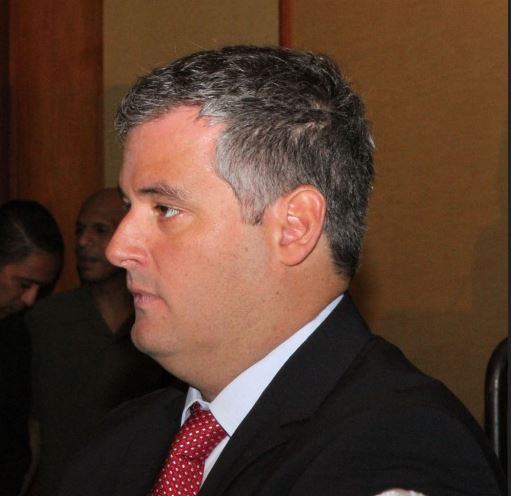
Jimmy Papadimitriu, a prominent political operative in both the USA and Panama, jailed here on bribery suspicions
by Eric Jackson
Is he the first American to go to jail over the Odebrecht scandal? The silence from the US media is deafening, but then again the biggest shareholder of The New York Times owns construction company interests, and at least one of those companies, FCC, has sometimes partnered with the tainted Brazilian multinational conglomerate. Perhaps that’s an uncalled-for stretch of economic determinist conspiratorial thinking. The various media of the US corporate mainstream do have many inputs to their different editorial policies and the Times has company in its silence.
For whatever reason that it’s a non-story in the United States, a prominent Republican operative, a dual US and Panamanian citizen and perhaps the holder of yet another country’s passport as well, is being held in Ancon’s DIJ lockup on suspicion of bribery. Demetrio “Jimmy” Papadimitriu, the son of a late businessman of Greek origin with various investments but who mainly made his substantial fortune in seafood exporting, has mostly made his living in politics. Wearing his gringo hat he was a congressional aide to former US Repesentative and Speaker of the House John Boehner. He worked for the Miami Republican political consulting firm of Alex Castellanos and in that role was part of the team of consultants led by Karl Rove that played a major role in George W. Bush’s 2004 re-election campaign. Both with the Castellanos firm and later with the US government funded and ostensibly nonpartisan International Republican Institute (IRI) he traveled the world lending GOP sorts of advice to the politics of many countries.
As a Panamanian, Papadimitriu was Ricardo Martinelli’s Minister of the Presidency from mid-2009 to mid-2012. There was a falling out. En route to his departure there were arguments over some land transactions involving Papadimitriu’s parents, allegations and an abruptly aborted criminal case about somebody hacking the minister’s email account, and WikiLeaks cable references that reasonably raise the question of whether as minister he was Martinelli’s back channel to the American Embassy or the embassy’s prized informant in the Panamanian cabinet. Quietly until afterward, Papadimitriu turned on Martinelli in the 2014 campaign when the now jailed former president was attempting a Putin-style proxy re-election. The very smooth political operative is generally careful not to let personal emotions show, but that would-be proxy president José Domingo “Mimito” Arias was the instrument of the legally flawed expropriation from Papadimitriu’s parents of a valuable tract of land along a beach west of the capital may have been part of his reason to work as an unpaid volunteer for the Juan Carlos Varela campaign.
Tales of large Odebrecht payofffs to Papadimitriu when he was a government minister have been shopped around for some time, with a specific reference to and denial of a $4 million payment appearing in La Prensa in early July. At the time Papadimitriu categorically denied any payment.
But then the leading daily newspaper in Spain, El Pais, published the story of how Odebrecht deposited $10 million into an account it created at a notorious bank in Andorra in the name of Papadimitriu’s parents. The first of those deposits was for $4 million. The primary source of that story was on the face of it a lawyer who is in some legal trouble himself but there surely had to be corroborating sources for El Pais to have run the story.
Within a day Jimmy Papadimitriu and former Minister of Public Works Jaime Ford were being questioned by prosecutors, and after about 12 hours of depositions both were ordered held without bail and taken to the DIJ jail in Ancon. Papadimitriu, who said that he had appeared voluntarily and wanted to protect his unjustly impugned mother — his father is now deceased — said that the $10 million was for business that the family company did with Odebrecht, providing sand for the Cinta Costera and other projects. He continues to deny that he personally received anything from Odebrecht. The way that the Panamanian political system works, it would generally be difficult for any cabinet member, particularly a minister of the presidency, to deny a role in the awarding of a large public works contract. With the exception of Panama Canal works, those things have to be approved by the cabinet and in many cases then sent to the legislature. Odebrecht was awarded billions of dollars worth of government contracts during Papadimitriu’s time in the cabinet.
Who might be in a position to leak information linking Papadimitriu to Odebrecht? When one follows the whole Odebrecht saga, and then backtracks from details recently published, that could be an interesting question with lots of suspects. It’s actually a good example of the fallacy of many grand conspiracy theories — if too many people know about something, then it’s hard to keep it a secret.
Odebrecht people, from the former CEO down, are singing to get out of jail or stay out of jail. Former “outside counsel” for Odebrecht, Brazilian-Spaniard attorney Rodrigo Tacla, is the “loose cannon” source of data that it appeared that the company’s “cooperating witnesses” had been holding, and his tales to Spanish prosecutors seem to have corroboration in the records of financial transfers. Prosecutors and other legal system functionaries in several countries would have access to the lyrics to those various songs. The bank involved, Banca Privada D’Andorra, has for years been accused by Washington of being a money laundering mill. It has played a role in many political scandals in a number of countries, including in Panama but most of all in Spain and its semi-autonomous Catalan region. The bank is so notorious that the Andorran government reluctantly intervened in it starting in 2015, while its Panama branch, as with some of its offices in third countries, has been taken over and liquidated by local banking authorities. Thus in addition to people who work in courts and prosecutors’ offices, information about that bank’s transactions would be available to people working for bank regulation agencies in several countries.
So, despite the arrest of a Republican political operative on Odebrecht-related charges, will it continue to be a non-story in the United States? Perhaps. Former company CEO Marcelo Odebrecht, now in prison but hoping to shorten his stay by having turned state’s evidence, has said that the company would either bribe all significant political parties in a country where it operated or wouldn’t bribe any of them.
What about the United States? Odebrecht gave to Jeb Bush’s foundation and then got large Florida highway contracts once he became governor. Odebrecht gave to erstwhile Miami-Dade Democratic boss Xavier Suarez’s PAC, and Suarez helped the company get the contracts to expand Miami’s international airport. Under US law that would not equal bribery — you generally have to prove a specific quid pro quo to convict on that in the USA. Also, statutes of limitations have run since some of those donations even if they were criminal. Odebrecht’s US subsidiary works out of a Miami office and has projects in North Carolina, Texas and California. Is there corruption in any of them? It may not be considered newsworthy, nor worthy of any official investigation, but there are too many people talking in too many places to automatically presume that Jimmy P. will be the only American caught up in the Odebrecht scandal.
~ ~ ~
These announcements are interactive. Click on them for more information.










